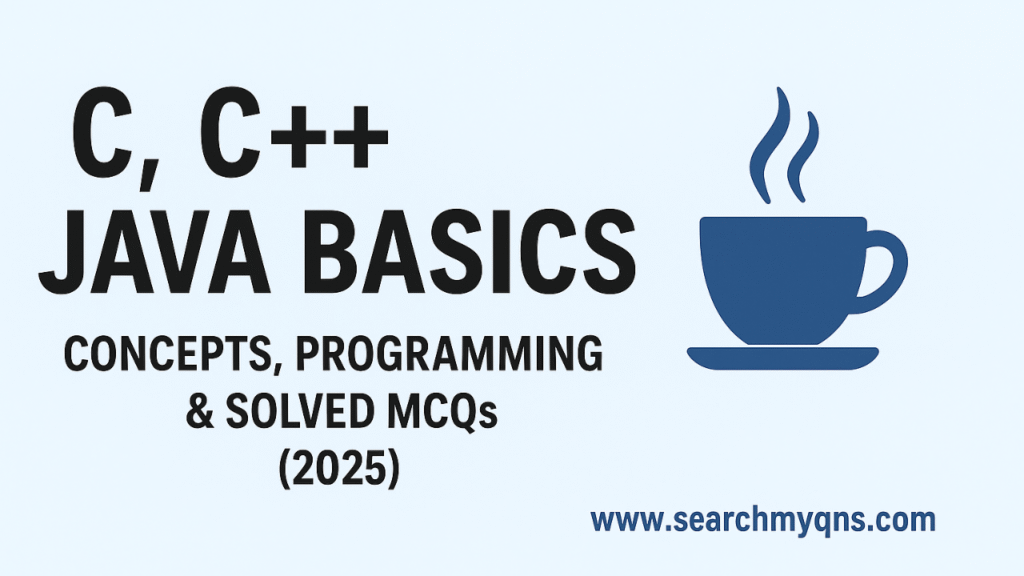C, C++, Java Basics: Complete Guide for Aptitude & Technical Exams (2025)
Programming languages like C, C++, and Java are the foundation of computer science and play a vital role in coding interviews, competitive exams, and aptitude tests.
This guide covers basic concepts, syntax, solved examples, and MCQs to help you prepare effectively for exams and technical assessments in 2025.
What is C?
- C is a general-purpose, procedural programming language.
- Developed by Dennis Ritchie in the 1970s.
- Known as the mother of all programming languages because many languages (C++, Java, Python) are influenced by C.
Features:
- Structured language.
- Portable and efficient.
- Used in operating systems, embedded systems.
- Example (Hello World in C):
#include<stdio.h> int main() { printf("Hello, World!"); return 0; }
What is C++?
- C++ is an object-oriented programming language developed by Bjarne Stroustrup in the 1980s.
- Extension of C with added features like classes and objects.
Features:
- Supports OOP (Inheritance, Polymorphism, Encapsulation, Abstraction).
- Faster execution (compiled).
- Widely used in system software, game development, high-performance applications.
Example (Hello World in C++):
#include <iostream>
using namespace std;
int main() {
cout << "Hello, World!";
return 0;
}
What is Java?
- Java is a high-level, object-oriented programming language developed by James Gosling at Sun Microsystems in 1995.
- Famous for its “Write Once, Run Anywhere” capability.
Features:
- Platform-independent (via JVM).
- Automatic memory management (Garbage Collection).
- Used in web applications, Android apps, enterprise software.
Example (Hello World in Java):
class Main {
public static void main(String[] args) {
System.out.println("Hello, World!");
}
}
Key Differences
| Feature | C | C++ | Java |
|---|---|---|---|
| Paradigm | Procedural | Object-Oriented | Object-Oriented |
| Memory Management | Manual | Manual | Automatic (GC) |
| Platform | Platform Dep. | Platform Dep. | Platform Independent |
| Inheritance | Not Supported | Supported | Supported |
| Compilation | Compiler Based | Compiler Based | JVM (Bytecode + JIT) |
Solved Examples
Example 1:
Which language is called the “mother of all programming languages”?
Answer: C
Example 2:
Which feature makes Java platform-independent?
Answer: JVM (Java Virtual Machine)
Practice Questions
Who developed the C language?
(a) Bjarne Stroustrup
(b) Dennis Ritchie
(c) James Gosling
(d) John McCarthyWhich of these supports Object-Oriented Programming?
(a) C
(b) C++
(c) Java
(d) Both (b) and (c)Java programs are executed by:
(a) Compiler
(b) Assembler
(c) JVM
(d) Interpreter
Tips for Exam Preparation
- Revise the history and features of C, C++, and Java.
- Practice identifying differences between procedural and OOP concepts.
- Learn basic syntax of Hello World, loops, functions, classes.
- Attempt MCQs from previous exam papers.
FAQs:
Q1. Which language is best to start with: C, C++, or Java?
Start with C for basics, then move to C++, and finally Java for real-world applications.
Q2. Why is Java called platform-independent?
Because it runs on JVM (Java Virtual Machine) which allows the same code to run on any OS.
Q3. Which is faster: C or Java?
C is generally faster since it is closer to hardware, but Java provides more portability and features.
